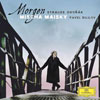Dvorak; Strauss, R Cello Chamber Works
Wholehearted performances that make the best of youthful musical ideas
View record and artist detailsRecord and Artist Details
Composer or Director: Antonín Dvořák, Richard Strauss
Genre:
Chamber
Label: Deutsche Grammophon
Magazine Review Date: 3/2009
Media Format: CD or Download
Media Runtime: 75
Mastering:
Stereo
DDD
Catalogue Number: 4777465

Tracks:
| Composition | Artist Credit |
|---|---|
| Sonata for Cello and Piano |
Richard Strauss, Composer
Mischa Maisky, Cello Pavel Gililov, Piano Richard Strauss, Composer |
| Romanze |
Richard Strauss, Composer
Mischa Maisky, Cello Pavel Gililov, Piano Richard Strauss, Composer |
| Sonatina for Violin and Piano |
Antonín Dvořák, Composer
Antonín Dvořák, Composer Mischa Maisky, Cello Pavel Gililov, Piano |
| Romantic Pieces |
Antonín Dvořák, Composer
Antonín Dvořák, Composer Mischa Maisky, Cello Pavel Gililov, Piano |
| Rondo |
Antonín Dvořák, Composer
Antonín Dvořák, Composer Mischa Maisky, Cello Pavel Gililov, Piano |
| (4) Lieder, Movement: No. 4, Morgen (wds. J H Mackay: orch 1897) |
Richard Strauss, Composer
Mischa Maisky, Cello Pavel Gililov, Piano Richard Strauss, Composer |
Author: John Warrack
Dvorák’s Sonatina was originally a violin-andpiano piece for two of his children, and though Maisky takes it with a light touch, and despite clear and sympathetic piano accompaniment from Gililov, it does not really go as well on the cello. The last of the Four Romantic Pieces, which began life as a Trio and which Dvorák said he had hugely enjoyed writing, fares better in this arrangement; and the Rondo, in which it sounds as if Dvorák enjoyed himself more and more as it goes on, is charmingly played. An excellent recording deals admirably with the notorious balance problems of cello and piano.
Discover the world's largest classical music catalogue with Presto Music.

Gramophone Digital Club
- Digital Edition
- Digital Archive
- Reviews Database
- Full website access
From £8.75 / month
Subscribe
Gramophone Full Club
- Print Edition
- Digital Edition
- Digital Archive
- Reviews Database
- Full website access
From £11.00 / month
Subscribe
If you are a library, university or other organisation that would be interested in an institutional subscription to Gramophone please click here for further information.




